RECENT COMMENTS
Churches own many vacants along Fairmount Avenue
Stacey Martin manages a tremendous amount of vacant property in the area and gets tagged a slumlord. Oliver Lawrence is a convicted slumlord currently serving time in one of his dilapidated houses on 19th Street. What do you call a church that owns a block’s worth of vacants?
In poking around Fairmount Avenue with the Richmond Parcel Mapper while researching Stacy Martin/Hermitage Realty’s vacant empire across the neighborhood, I found out that one of the more prominent churches back this way owns a long-vacant house on a busy corner of Fairmount Avenue. Fast forward a few weeks, and the discussion around the the Union Hill O&H District brought to light the 13 vacant lots/properties owned by the Temple of Judah.
This prompted some further digging, which revealed that the habit of holding vacant lots isn’t just for Temple of Judah, as both of Fairmount Avenue’s Mount Tabor and Bethlehem Baptist hold 6 and 10 vacant lots/houses, respectively. Included in this count for each is at least one lot has seen a house demolished in the past 5 years.
At least some of the vacant lots are official or unofficial parking for the churches. A few, but not all, of the vacants attributed to Mount Tabor are the parking lot attached to the church. Beside this, though, are the now-vacant-lot at 2003 Fairmount Avenue and the long-time vacant house at 2001 Fairmount Avenue. Is this an exercise in expansion by neglect? Will these lots be paved parking in 5 years?
Sitting sandwiched between Bethlehem Baptist’s vacant lots in the 2000 block of Fairmount and across the street from Mount Tabor’s vacant lot and boarded up house is the 2009 Golden Hammer Award-winning renovation at 2008 Fairmount. The Better Housing Coalition, a non-profit affordable housing-oriened CDC, has build or restored at least 2 other houses on Fairmount Avenue since 2005. Imagine Fairmount Avenue if the churches were to make 2010 the year of building quality affordable housing on their vacant lots…
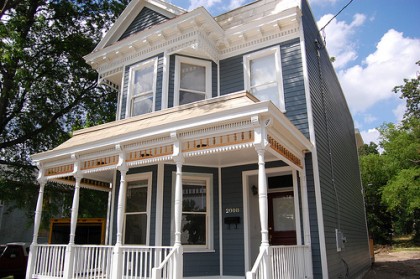
Bethlehem Baptist Church
1920 Fairmount Avenue (church)
2004 Fairmount Avenue (vacant lot)
2010 Fairmount Avenue (vacant lot)
1318 N 20th Street (vacant lot)
1316 N 20th Street (vacant lot)
1310 N 20th Street (vacant lot)
1308 N 20th Street (vacant lot)
1306 N 20th Street (vacant lot)
1311 N 19th Street (vacant lot)
1309 N 19th Street (vacant lot)
1307 N 19th Street (vacant lot)
1900 Fairmount Avenue (residence)
Mount Tabor
2013 Fairmount Avenue (church)
2009 Fairmount Avenue (vacant lot)
2007 Fairmount Avenue (vacant lot)
2005 Fairmount Avenue (vacant lot)
2003 Fairmount Avenue (vacant lot)
2001 Fairmount Avenue (vacant house)
1211 North 21st Street (vacant lot)


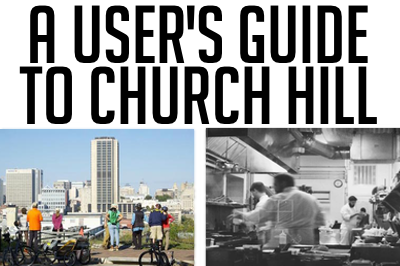


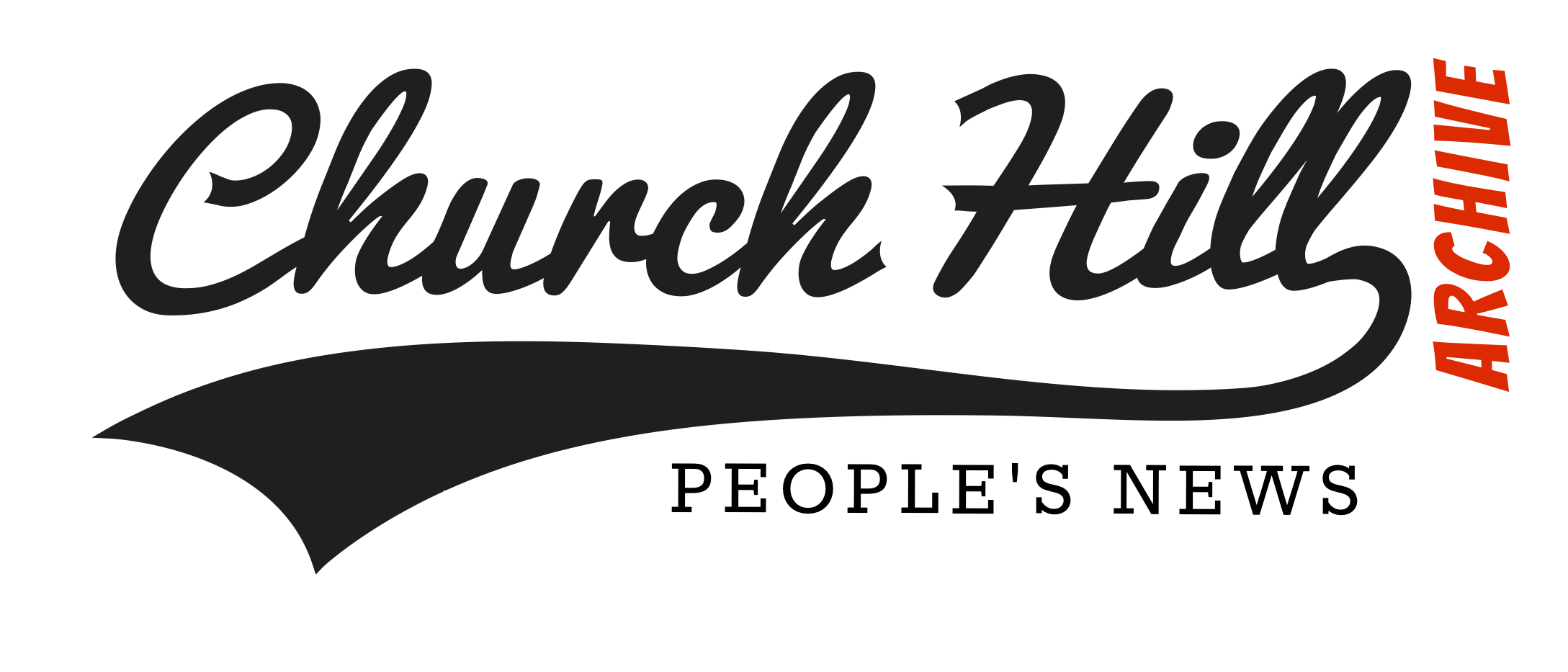
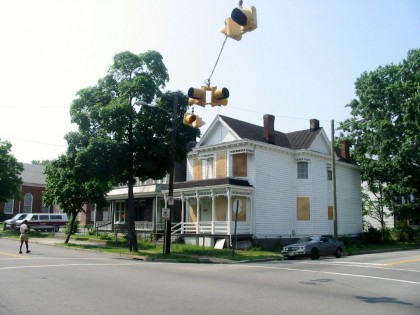
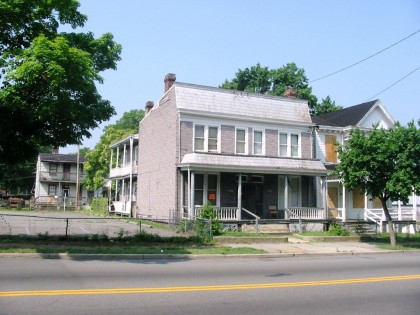
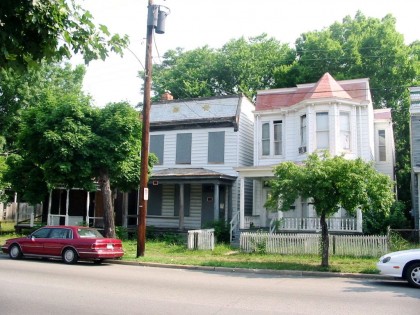
“Imagine Fairmount Avenue if the churches were to make 2010 the year of building quality affordable housing on their vacant lots…”
I’d take that a step further. What if not only these two churches, but a whole bunch of churches, went together to build quality affordable housing all around that area, and not just on Fairmont Avenue? If they pooled their resources, and partnered with BHC, what a difference they could make!
Has anybody tried to explore the rationale of these churches holding onto these properties? They obviously are not generating any income to support the “flock”. If anything, there is a significant cost to hold onto them (property taxes, management fees, ?general cleanup).
WHile not being a regular church-goer, so I can’t say for sure, I always assumed that Churches were supposed to help others, inspire folks, be a positive force in the community; that sort of thing…Apparently I’m wrong
I work for a church that owns two vacant historic homes. I can’t speak for the two churches on Fairmount but I can speak for our church’s experience. Our church’s two homes have been a part of the church’s history for nearly 100 years. The church really wants to renovate the homes but can’t because the amount of renovation costs: the home is full of lead paint and falling walls. The costs to renovate the homes are far more than the church can bear but unfortunately does not want to sell the homes.
Often churches will buy properties for their ministers, but I can’t see that as the case for the two churches on Fairmount.
I think the best solution for these churches is to sell them to BHC and let them renovate the homes. The only problem is that BHC can’t sell the home on Fairmount to begin with. Anyone have a guess why they can’t? It is going for a really good price, $184,000.
Perhaps, rather than speculate about the why’s and wherefor’s of these properties, one should pick up the phone, make an appointment with one of the pastors or the heads of the churches’ boards of trustees, and actually ask them for their comment.
Remember the second half of the phrase “citizen journalist…”
Taloose, I’m pretty sure that no religious institution in the US pays any sort of taxes, property or otherwise.
I’m not so interested in their excuses or reasoning. The facts are that they own these properties and have held them vacant for years to the detriment of the surrounding communities.
Sorry, John, I may have spoken out of turn. I thought CHPN was an attempt at citizen journalism.
I’ll continue to enjoy the gossip, though!
🙂
I think of it as “distributed” journalism, if anything. I’ve put my piece up, perhaps someone else will follow-up with more (your phone works as well as mine, yes?)
If a private individual held these lots, she would have to pay taxes on them and that would most likely motivate her to sell, rent, build, make productive, etc.
The fact that religious organizations generally aren’t taxed means that they CAN hold on to properties like these relatively indefinitely (once the property itself is paid for it costs the church nothing to just let it sit vacant / blighted / empty forever).
Great post John, thanks!
#5/7 What’s with the dig? He garnered the data and presented us with the facts.
From the CHPN “about us” page:
Help us out!
chpn is not a newspaper or magazine. We are a neighborhood news blog, a grass-roots publication with no staff reporters or editors. We are dependent on readers and contributors for all of our content.
Neglected properties and vacant lots drag down property values, disrupt a sense of community, invite crime, encourage littering, discourage development, raise the risk of fires, and make neighborhoods less appealing to potential homeowners.
What is a citizen to do when a church, of all things, perpetuates blight in your community?
I wonder how many of Temple of Judah, Mount Tabor, and Bethlehem Baptist’s parishioners actually live within walking distance of the church? Another curiosity, what local houses of worship are doing right by their neighbors and can serve as positive models? I am going to try to find out.
Excellent work, John!
I think if the property is not being used for a church purpose they are supposed to be paying taxes on it – but I would guess that they have found ways around the rules.
#4 – please ask your church to consider selling their properties. What good are they doing the church or the community in their long vacant state? Lead paint and falling down walls have never stopped anyone else from renovation, that is a lame (and lazy)excuse.
It is a good question. I didn’t pay attention to how many properties my church, Mt. Tabor, owned. I knew it owned all the lots facing Fairmount. It also owned and demolished Fairmount’s town hall, a two story store that was on the corner at 21st St. I believe the church sold the lot and a new house was built on it. In 1998, if I can recall, the houses on the corner were to be demolished for the parking lot. But really, I do wonder why the churches can’t help build the neighborhoods. I know a church that’s not even in Woodville that built a new house on two lots across from Woodville Church which used to own the lots. I could ask Rev. Ponder about the properties and plans. I think it would be nice if the streetscapes won’t have more holes.
By the way, I can walk to church, but I rather not.
#4… Eric, I know one problem is the home directly beside it. I’ve heard people say they love the home for sale, but wouldn’t want to have that crumbling eyesore next door. Unfortunately, it’s another case of someone holding a property and not wanting/being able to sell or repair.
It is a beautiful home though, inside as well. They do open house tours Sundays 1-4…check it out so you can tell others it’s WORTH buying.
Because, honestly, the eyesores and vacants will eventually change, judging by the recent growth and renovations throughout Church Hill.
The town has a right to tell the property owner they must maintain the property.
The citzens have a right to tell the town what to do.
The citizens are paying the salary of the representatives and congressmen.
The church is NOT paying anyone’s salary. The church is run on donations from the citizens and grants.
God will not punish you for doing your duty to your home and for your town by standing up for your right to a safe and sightly neighborhood.
God would probably prefer the property housed the needy, or was sold and the money go to charity, directly.
Having more than you need is not Christian behavior, especially if you blatantly fail to share.
That’s a slap in the face to the poor, and an obvious disrespect to tithers.
Sounds like the churches are holding onto their glebe. It is part of their power structure.
I believe they should pay taxes on it just like I do, just like corporations do.
Stretch Monster: Churches=Taxes…good point. I didn’t consider that there were no property taxes imposed on these locations. If that is the case, and nobody seems to be making any money on these buildings (church, city, etc.), I believe it would be in everybody’s best interest to get these into the hands of “responsible” ownership. When properties such as these form a cancer in a neighborhood, the city should take the appropriate steps to force a positive resolution.
Can any of the existing City building codes be used as leverage against keeping these buildings vacant? I’m aware of the [no weeds taller than 12″ rule, trash, obvious safety issues]…but, are there reasonable standards of appearance that need to be up held? I realize is a loaded question…I’m not referring to an HOA type of policing/enforcement. How long can a building in a neighborhood be “boarded-up” if it has no active construction permit? Have other cities successfully launched programs to force owners to comply with basic standards (reasonable exterior maintenance, utilities functioning, etc.)?
That is the essential question raised by the Stacy Martin/Hermitage Realty houses. If vacant houses meet the basic required code, what options are there to urge the owners to actually renovate or sell? Some of these houses have been boarded up for *years*.
Maybe the city should start requiring that houses be secured/boarded up from the inside. That way, they’d be less of an eye-sore and hide the fact that so many houses are vacant.
Many older, inner-city areas have experienced this same situation and have made progress to get the job done. I suspect that they have more aggressive codes on the books to help move an effort forward.
It is in the city’s best interest to get these properties back on the tax “contributor’s roll”. Do you think the church leadership would be amenable to participating in a group meeting so we can better understand the other’s position? If Cynthia Newbille was instrumental in helping the city toughen its position on long-vacant properties, that alone, would be her single, largest contribution to this community.
i have noticed many houses that are boarded up were actually in the process of being renovated at some point before or after they were boarded. it seems like work on them just stopped at some point.
this i noticed in the ones i was able to look into at some opening.
Perhaps you don’t realize your Mayor’s church is one of the biggest offenders of owning/not maintaining vacant property. His church was brought to court in years past. I think you will find city hall will tell you what you want to hear about inspector’s coming down on blighted property, but in fact, measures seem to be taken to dismantle real aggressive enforcement. The efforts against Oliver Lawrence were well underway when Jones took office – the momentum was already in place (it takes a great deal of time and steady effort to have this kind of effect). I doubt you will continue to see that kind of effectiveness under this administration. Didn’t you hear the thundering silence from city hall after the Lawrence verdict? That case set state records for the size of fine and jail time for code violations. The mayor should have been holding press conferences touting the effectiveness of the city’s efforts and pledging to continue. Instead there was an order from city hall to not talk to the press. No follow up. No congratulation to the staff. No celebration of the effort to make headway on blighted properties. It seems to me the Mayor is more interested in things being the way the used to be, instead of how they could be.
Baltimore had a homesteading program with vacant houses in the inner city area, they sold them for something like five bucks, but the new owners had a fixed amount of time to rehab them or they had to give them up, as I recall.
I heard about it around ten years ago from a mortgage banker named Richard Day, came here from B’more. He was really knowledgable about the B’more program, told me about it ten or twelve years ago, and tried to sell our city council on doing something similar but they didn’t want to do it.
I don’t know how to get around getting vacant houses away from owners; when the taxes are delinquent, the city does auction the houses off. But in the case of churces, since they don’t have to pay taxes to begin with, such an action doesn’t happen. And if the taxes are paid on the others, again, not sure what action if any can be taken, particularly if the basic code issues are met.
Plus, Virginia is real into property rights, and some folks tend to view anything from the Chesapeake Bay Act to other things as a ‘taking.’
If someone reading this is really into trying to start a homesteading program, or looking for other ways to get vacant housing into being occupied, call Wells Fargo Mortgage and try to reach Richard Day, maybe he’s got some insight into the issues involved. Last I heard, he was with Wells Fargo Mortgage, that was two or three years ago, hopefully he’s weathered the current economy and is still there.
John Murden – have you checked into the spot blight laws? I don’t know much about them, just have heard of them.
I can’t speak to these churches’ plans specifically, but I do know a church or two in the area has been working to ‘collect’ houses as part of a long term redevelopment strategy for the neighborhood. I’d hope that is what is going on here. As I’m sure everyone realizes, if you are going to try to make an impact on a block or neighborhood, it is much cheaper to purchase of all the targeted properties up front while the values are depressed and then begin work. If you can afford that. If you try to buy them one at a time and fix them up, you’ll have to compete with investors at some point that can drive the prices up and may not have the area’s best interests at heart as a church or a BHC would(should). Instead of implementing a new city program (when we have so many that aren’t run to their full potential) I’d encourage the city to work closer with the church and neighborhood to support the projects in what ever way possible (faster approvals, federal money, etc.)
@#25- Day does still work at Wells.
I’m not certain, but I think the RE tax exemption for church-owned property refers to property that is part of the religious ministry. I’m not certain about that, though. #25, Virginia state law is very weak in terms of giving localities strong code enforcement tools. City Council has tried several times in the past four years, working through Virginia Municipal League, to be given additional powers dealing with blight. Opposed at the state level by lobbyists for the Virginia Association of Realtors. For those with questions about code enforcement, try this: have your neighborhood association invite code enforcement officers to your meeting to outline what the standards are, and how they can be used. It also helps to report violators to the city website for Citizen Requests for Service. I have also heard that there is an ordinance before council creating a new program to deal with blight and to create new affordable housing.
@24, you’re spot-on with Reverend/Mayor Dwight and the vacants south of the rivah.
And the funding for those southside houses? Your tax dollars via Richmond Economic Development Authority low-interest loans which are not being paid back to the Industrial Development Authority. Blighted houses purchased by you and but warehoused by our Mayor’s Church.
Reverend Dwight/Mayor is now focused on his next big rip off scheme: deciding which of his buddies are gonna get the contracts on building the new Hugenot HS (gotta keep those tax dollars rollin back to papa).
RRHA administers Virginia’s Urban Homesteading Program whereby houses can be purchased for $1:
http://www.rrha.org/html/homeownership/urban.htm
As for code enforcement issues, attending and speaking out at your local CAPS meeting is effective. CAPS schedules for our neighborhood are posted here on CHPN.
Would it be very cynical of me to suggest it would be a nice tax dodge for a non-profit organization?? Seems the obvious answer why a church would hold onto an asset they don’t have to pay taxes on.
Churches do have to pay RE taxes for non church property. The exemption is only for the church itself and the pastor’s house, and it is not automatic – they need to apply.
Also, the tradition in many urban churches (for some reason) is that the surrounding property will often be in the pastor’s name, not the church’s name. By way of example, anyone may check the public records on what the bishop at Temple of Judah owns on and around Venable. That would be another great thread.
The churches should get together and form their own NEIGHBORHOOD cdc, complete with voting members from the neighborhood.
Ohhic.org
yo it’s like the vatican up in here!
Please note that while the price is $184,000 monthly payments may be as low as $945. The sale prices includes grant funding because the house is located in an area targeted for revitalization. $945 per month is an incredible value for a 3BR, 2.5 BA 2150 s.f., historic home.
#35 references 2008 Fairmount Ave.
So here’s my overall issue with this…I feel that it is absolutely unacceptable to leave anything abandoned…whether the organization is an agency, church, or realtor…I am currently a college student and have been living in Richmond all of my life and throughout my 22 years of living I have sadly seen several hundreds of homes serving as waste property within such a beautiful city…I currently reside in Highland Park and the homes have thoughtful landscaping that took dedication and technique to build the structuring is spacious and beautiful therefore it is depressing when I have to come home to see an abandoned unit per block…it’s ridiculous and absolutely disgusting and something needs to be done about this because it is also the cities’ properties that have been neglected and it isn’t right for the city to punish others for acts that they are committing…what sense does that make?…buying a home is like having a child…you have to make sure your baby is being well taken care of…since these people decided to purchase these properties they need to take full responsibilty towards taking care of their children!…DON’T BITE OFF MORE THAN YOU CAN HANDLE!